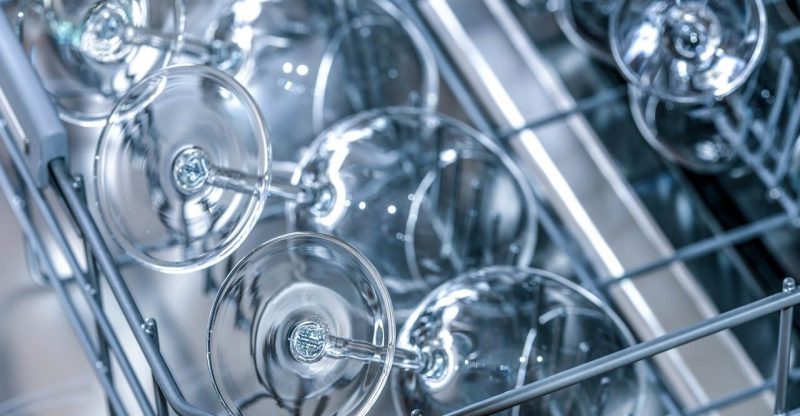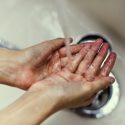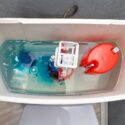What Is The Milky Film On Glasses From The Dishwasher?
What is the milky film on glasses from the dishwasher? So, I assume you have just noticed a white film on the surface of your glassware after removing them from the dishwasher.
The most common reasons for this film are using hard water or excess detergent. Etching, a form of permanent corrosion, can also cause your glasses to appear cloudy.
What is Etching?
Etching happens when glassware material slowly corrodes, resulting in tiny pits and scratches on their surface.
Etching is caused by using very hot water, too much detergent, using very soft water or excessive pre-washing of the glassware before placing them in the dishwasher.
Unfortunately, cloudiness caused by etching is permanent. The only thing you can do is try to prevent it in the first place.
Causes of Milky Film on Glasses
Do a quick test to determine whether the white film is caused by etching or some other factor. Dip the glass in vinegar for a few minutes and see if the cloudiness disappears.
If it doesn’t, that’s etching and there’s nothing you can do about it. If it disappears, it’s just a harmless film that you can easily prevent.
To keep the film from forming, it’s important to determine what likely caused it. Here are some possible reasons.
1. Using Hard Water
Millions of homes in the UK receive hard water, the hardest water being in the South and East regions of the UK.
There are two problems with using hard water.
First, it does not dissolve detergents easily. This forces you to use more detergent so that the water becomes soapy. The excess detergent that does not dissolve in the water settles on the glassware surfaces and forms the white film.
Secondly, hard water does not rinse soap easily. This leaves the film of soap or even dirt on the glassware surface resulting in the milky film.
The best way to deal with hard water is to install a water softener system in your home. A water softener uses an ion exchange resin to replace the hard water ions in your water with salt (sodium or potassium chloride).
On the downside, a whole house water softener is fairly expensive. A cheaper solution is to use rinse aid. Rinse aid makes it easier for hard water to rinse detergent off dishes by reducing the surface tension of water.
You should see a compartment for rinse aid in your dishwasher.
2. Using Too Much Detergent
Most people use more detergent in their dishwasher than they need to. Modern dishwashers use way less water so there’s no need to add a lot of detergent.
You are flushing money down the drain and possibly damaging your precious glassware.
Using excess detergent makes it difficult to wash it off completely from the surface of glasses. The undissolved detergent settles to form the white film. Over time, it can result in permanent damage, AKA etching.
If the reason you are using a lot of detergent is hard water, use rinse aid to get a more thorough rinse.
If you have soft water but you still get a white film, check if the dishwasher is heating water properly. Detergents work best in hot water. Hot water is also more effective in removing fats and food residues that may form a white film on your glassware.
3. A Dirty Dishwasher
Your dishwasher accumulates a lot of junk over time. This includes oils, fats and food residues. If you have hard water, hard water deposits will also build up inside the washing machine.
All these can transfer to your glassware and form a milky film on them.
Wash your dishwasher at least once a month to keep it clean. Check the product manual for instructions on how to clean the dishwasher, and buy a good dishwasher cleaner.
How to Remove the Milky Film From Glasses
A. Citric Acid
Citric acid easily dissolves minerals and fats and oils, making it a perfect solution for removing the white, milky film.
Pour citric acid in the dishwasher’s detergent compartment and then run a complete wash cycle.
If you want to clean the dishwasher only to remove hard water residue from the inside, run wash cycle with an empty dishwasher.
B. Vinegar
Soak the affected glasses in undiluted white vinegar for about 15 minutes. Rinse the glasses then dry them.
How to Prevent Etching
If, after trying to use vinegar, you realise the cloudiness is actually etching, the best thing to do is prevent it from getting worse or forming on other glassware.
Do not rinse or wash glasses too much before putting them in the dishwasher. Modern dishwashers (even the budget ones) are really good; so good that you can usually put dishes as they are without rinsing.
Heavily pre-rinsing glasses eliminates oils and fats for the detergent to react with. So instead, it corrodes the glass surface.
Using less detergent can also help reduce corrosion on glasses.
Sometimes, the problem is the specific detergent you are using. If you’ve reduced detergent use and are careful with pre-rinsing but still see some etching, try another brand of detergent.





